- Home
- Frank Herbert
The Dosadi Experiment c-2 Page 12
The Dosadi Experiment c-2 Read online
Page 12
She pointed to the dead-man switch, a question.
"It's only a signal relay," he said. "No bomb in this one."
She remained silent, forcing him to focus on his doubts.
The guard swallowed. "What do you . . ."
"Join us or die."
He peered past her at the others. Things such as this happened frequently in the Warrens, not very often here on the slopes which led up to the heights. The guard was not a one trusted with full knowledge of whom he guarded. He had explicit instructions and a dead-man relay to warn of intruders. Others were charged with making the more subtle distinctions, the real decisions. That was this building's weak point.
"Join who?" he asked.
There was false belligerency in his voice, and she knew she had him then.
"Your own kind."
This locked his drug-dulled mind onto its primary fears. He knew what he was supposed to do: open his hand. That released the alarm device in the dead-man switch. He could do this of his own volition and it was supposed to deter attackers from killing him. A dead man's hand opened anyway. But he'd been fed with suspicions to increase his doubts. The device in his hand might not be a simple signal transmitter. What if it actually were a bomb? He'd had many long hours to wonder about that.
"We'll treat you well," Tria said.
She put a companionable arm around his shoulder, letting him get the full effect of her musk while she held out her other hand to show that it carried no weapon. "Demonstrate to my companion here how you pass that to your relief."
One of the young males stepped forward.
The guard showed how it was done, explaining slowly as he passed the device. "It's easy once you get the trick of it."
When her companion had the thing firmly in hand, she raised her arm from the guard's shoulder, touched his carotid artery with a poisoned needle concealed in a fingernail. The guard had only time to draw one gasping breath, his eyes gaping, before he sank from her embrace.
"I treated him well," she said.
Her companions grinned. It was the kind of thing you learned to expect from Tria. They dragged the body out of sight into the guard alcove, and the young male with the signal device took his place at the door. The others protected Tria with their bodies as they swept into the building. The whole operation had taken less than two minutes. Everything was working smoothly, as Tria's operations were expected to work.
The lobby and its radiating hallways were empty.
Good.
Her agent in this building deserved a promotion.
They took a stairway rather than trust an elevator. It was only three short flights. The upper hallway also was empty. Tria led the way to the designated door, used the key her agent had supplied. The door opened without a sound and they surged into the room.
Inside, the shades had been pulled, and there was no artificial illumination. Her companions took up their places at the closed door and along both flanking walls. This was the most dangerous moment, something only Tria could handle.
Light came from thin strips where shades did not quite seal a south window. Tria discerned dim shapes of furniture, a bed with an indeterminate blob of darkness on it.
"Jedrik?" A whisper.
Tria's feet touched soft fabric, a sandal.
"Jedrik?"
Her shin touched the bed. She held a weapon ready while she felt for the dark blob. It was only a mound of bedding. She turned.
The bathroom door was closed, but she could make out a thin slot of light at the bottom of the door. She skirted the clothing and sandal on the floor, stood at one side, and motioned a companion to the other side. Thus far they had operated with a minimum of sound.
Gently, she turned the knob, thrust open the door. There was water in a tub and a body face down, one arm hanging flaccidly over the edge, fingers dangling. A dark purple welt was visible behind and beneath the left ear. Tria lifted the head by the hair, stared at the face, lowered it gently to avoid splashing. It was her agent, the one she'd trusted for the intelligence to set up this operation. And the death was characteristic of a Gowachin ritual slaying: that welt under the ear. A Gowachin talon driven in there to silence the victim before drowning? Or had it just been made to appear like a Gowachin slaying?
Tria felt the whole operation falling apart around her, sensed the uneasiness of her companions. She considered calling Gar from where she stood, but a feeling of fear and revulsion came over her. She stepped out into the bedroom before opening her communicator and thumbing the emergency signal.
"Central." The voice was tense in her ear.
She kept her own voice flat. "Our agent's dead."
Silence. She could imagine them centering the locator on her transmission, then: "There?"
"Yes. She's been murdered."
Gar's voice came on: "That can't be. I talked to her less than an hour ago. She . . ."
"Drowned in a tub of water," Tria said. "She was knocked out first - something sharp driven in under an ear."
There was silence again while Gar absorbed this data. He would have the same uncertainties as Tria.
She glanced at her companions. They had taken up guard positions facing the doorway to the hall. Yes, if attack came, it would come from there.
The channel to Gar remained open, and now Tria heard a babble of terse orders with only a few words intelligible: ". . . team . . . don't let . . . time . . ." Then, quite clearly: "They'll pay for this!"
Who will pay? Tria wondered.
She was beginning to make a new assessment of Jedrik.
Gar came back on: "Are you in immediate danger?"
"I don't know." It was a reluctant admission.
"Stay right where you are. We'll send help. I've notified Broey."
So that was the way Gar saw it. Yes. That was most likely the proper way to handle this new development. Jedrik had eluded them. There was no sense in proceeding alone. It would have to be done Broey's way now.
Tria shuddered as she issued the necessary orders to her companions. They prepared to sell themselves dearly if an attack came, but Tria was beginning to doubt there'd be an immediate attack. This was another message from Jedrik. The trouble came when you tried to interpret the message.
***
The military mentality is a bandit and raider mentality. Thus, all military represents a form of organized banditry where the conventional mores do not prevail. The military is a way of rationalizing murder, rape, looting, and other forms of theft which are always accepted as part of warfare. When denied an outside target, the military mentality always turns against its own civilian population, using identical rationalizations for bandit behavior.
- BuSab Manual, Chapter Five: "The Warlord Syndrome"
McKie, awakening from the communications trance, realized how he must've appeared to this strange Gowachin towering over him. Of course a Dosadi Gowachin would think him ill. He'd been shivering and mumbling in the trance, perspiration rolling from him. McKie took a deep breath.
"No, I'm not ill."
"Then it's an addiction?"
Recalling the many substances to which the Dosadi could be addicted, McKie almost used this excuse but thought better of it. This Gowachin might demand some of the addictive substance.
"Not an addiction," McKie said. He lifted himself to his feet, glanced around. The sun had moved perceptibly toward the horizon behind its streaming veil.
And something new had been added to the landscape - that gigantic tracked vehicle, which stood throbbing and puffing smoke from a vertical stack behind the Gowachin intruder. The Gowachin maintained a steady, intense concentration on McKie, disconcerting in its unwavering directness. McKie had to ask himself: was this some threat, or his Dosadi contact? Aritch's people had said a vehicle would be sent to the contact point, but . . .
"Not ill, not an addiction," the Gowachin said. "Is it some strange condition which only Humans have?"
"I was ill," McKie said. "But I'm recovered. The condition
has passed."
"Do you often have such attacks?"
"I can go years without a recurrence."
"Years? What causes this . . . condition?"
"I don't know."
"I . . . ahhhh." The Gowachin nodded, gestured upward with his chin. "An affliction of the Gods, perhaps."
"Perhaps."
"You were completely vulnerable."
McKie shrugged. Let the Gowachin make of that what he could.
"You were not vulnerable?" Somehow, this amused the Gowachin, who added: "I am Bahrank. Perhaps that's the luckiest thing which has ever happened to you."
Bahrank was the name Aritch's aides had given as McKie's first contact.
"I am McKie."
"You fit the description, McKie, except for your, ahhh, condition. Do you wish to say more?"
McKie wondered what Bahrank expected. This was supposed to be a simple contact handing him on to more important people. Aritch was certain to have knowledgeable observers on Dosadi, but Bahrank was not supposed to be one of them. The warning about this Gowachin had been specific.
"Bahrank doesn't know about us. Be extremely careful what you reveal to him. It'd be very dangerous to you if he were to learn that you came from beyond the God Veil."
The jumpdoor aides had reinforced the warning.
"If the Dosadi penetrate your cover, you'll have to return to your pickup point on your own. We very much doubt that you could make it. Understand that we can give you little help once we've put you on Dosadi."
Bahrank visibly came to a decision, nodding to himself.
"Jedrik expects you."
That was the other name Aritch's people had provided. "Your cell leader. She's been told that you're a new infiltrator from the Rim. Jedrik doesn't know your true origin."
"Who does know?"
"We cannot tell you. If you don't know, then that information cannot be wrested from you. We assure you, though, that Jedrik isn't one of our people."
McKie didn't like the sound of that warning. ". . . wrested from you." As usual, BuSab sent you into the tiger's mouth without a full briefing on the length of the tiger's fangs.
Bahrank gestured toward his tracked vehicle. "Shall we go?"
McKie glanced at the machine. It was an obvious war device, heavily armored with slits in its metal cab, projectile weapons protruding at odd angles. It looked squat and deadly. Aritch's people had mentioned such things.
"We saw to it that they got only primitive armored vehicles, projectile weapons and relatively unimportant explosives, that sort of thing. They've been quite resourceful in their adaptations of such weaponry, however."
Once more, Bahrank gestured toward his vehicle, obviously anxious to leave.
McKie was forced to suppress an abrupt feeling of profound anxiety. What had he gotten himself into? He felt that he had awakened to find himself on a terrifying slide into peril, unable to control the least threat. The sensation passed, but it left him shaken. He delayed while he continued to stare at the vehicle. It was about six meters long with heavy tracks, plus other wheels faintly visible within the shadows behind the tracks. It sported a conventional antenna at the rear for tapping the power transmitter in orbit beneath the barrier veil, but there was a secondary system which burned a stinking fuel. The smoke of that fuel filled the air around them with acridity.
"For what do we wait?" Bahrank demanded. He glared at McKie with obvious fear and suspicion.
"We can go now," McKie said.
Bahrank turned and led the way swiftly, clambering up over the tracks and into a shadowed cab. McKie followed, found the interior a tightly cluttered place full of a bitter, oily smell. There were two hard metal seats with curved backs higher than the head of a seated Human or Gowachin. Bahrank already occupied the seat on the left, working switches and dials. McKie dropped into the other seat. Folding arms locked across his chest and waist to hold him in place; a brace fitted itself to the back of his head. Bahrank threw a switch. The door through which they'd entered closed with a grinding of servomotors and the solid clank of locks.
An ambivalent mood swept over McKie. He had always felt faint agoraphobia in open places such as the area around the rock. But the dim interior of this war machine, with its savage reminders of primitive times, touched an atavistic chord in his psyche and he fought an urge to claw his way outside. This was a trap!
An odd observation helped him overcome the sensation. There was glass over the slits which gave them their view of the outside. Glass. He felt it. Yes, glass. It was common stuff in the ConSentiency - strong yet fragile. He could see that this glass wasn't very thick. The fierce appearance of this machine had to be more show than actuality, then.
Bahrank gave one swift, sweeping glance to their surroundings, moved levers which set the vehicle into lurching motion. It emitted a grinding rumble with an overriding whine.
A track of sorts led from the white rock toward the distant city. It showed the marks of this machine's recent passage, a roadway to follow. Glittering reflections danced from bright rocks along the track. Bahrank appeared very busy with whatever he was doing to guide them toward Chu.
McKie found his own thoughts returning to the briefings he'd received on Tandaloor.
"Once you enter Jedrik's cell you're on your own."
Yes . . . he felt very much alone, his mind a clutter of data which had little relationship to any previous experience. And this planet could die unless he made sense out of that data plus whatever else he might learn here.
Alone, alone . . . If Dosadi died there'd be few sentient watchers. The Caleban's tempokinetic barrier would contain most of that final destructive flare. The Caleban would, in fact, feed upon the released energy. That was one of the things he'd learned from Fannie Mae. One consuming blast, a meal for a Caleban, and BuSab would be forced to start anew and without the most important piece of physical evidence - Dosadi.
The machine beneath McKie thundered, rocked, and skidded, but always returned to the track which led toward Chu's distant spires.
McKie studied the driver covertly. Bahrank showed uncharacteristic behavior for a Gowachin: more direct, more Human. That was it! His Gowachin instincts had been contaminated by contact with Humans. Aritch was sure to despise that, fear it. Bahrank drove with a casual expertise, using a complex control system. McKie counted eight different levers and arms which the Gowachin employed. Some were actuated by knees, others by his head. His hands reached out while an elbow deflected a lever. The war machine responded.
Bahrank spoke presently without taking his attention from driving.
"We may come under fire on the second ledge. There was quite a police action down there earlier."
McKie stared at him.
"I thought we had safe passage through."
"You Rimmers are always pressing."
McKie peered out the slits: bushes, barren ground, that lonely track they followed.
Bahrank spoke.
"You're older than any Rimmer I ever saw before."
Aritch's people had warned McKie about this as a basic flaw in his cover, the need to conceal the subtle signs of age.
They'd provided him with some geriatric assistance and an answer to give when challenged. He used that answer now.
"It ages you in a hurry out here."
"It must."
McKie felt that something in Bahrank's response eluded him, but dared not pursue this. It was an unproductive exchange. And there was that reference to a "police action." McKie knew that the Rim Rabble, excluded from Chu, tried periodic raids, most often fruitless. Barbaric!
"What excuse did you use to come out here?" McKie asked.
Bahrank shot a probing glance at him, raised one webbed hand from the controls to indicate a handle in the roof over his head. The handle's purpose was unknown to McKie, and he feared he had already betrayed too much ignorance. But Bahrank was speaking.
"Officially, I'm scouting this area for any hidden surprises the Rimmers may have s
tored out here. I often do that. Unofficially, everyone thinks I've a secret pond out here full of fertile females."
A pond . . . not a Graluz. Again, it was a relatively fruitless exchange with hidden undertones.
McKie stared silently ahead through a slit. Their dusty track made a slow and wide sweep left, abruptly angled down onto a narrow ledge cut from red rock walls. Bahrank put them through a series of swift changes in speed: slow, fast, slow, fast. The red rock walls raced past. McKie peered out and downward on his side. Far below lay jungle verdure and, in the distance, the smoke and spires of Chu - fluted buildings ranked high over dim background cliffs.
The speed changes appeared purposeless to McKie. And the dizzy drop off the cliff on his side filled him with awe. Their narrow ledge hugged the cliff, turning as the cliff turned - now into shadows and now into light. The machine roared and groaned around him. The smell of oil made his stomach heave. And the faraway city seemed little closer than it had from the cliff top, except that it was taller, more mysterious in its smoky obscurity.
"Don't expect any real trouble until we reach the first ledge," Bahrank said.
McKie glanced at him. First ledge? Yes, that'd be the first elevation outside the city's walls. The gorge within which Chu had been raised came down to river level in broad steps, each one numbered. Chu had been anchored to island hills and flats where the river slowed and split into many arms. And the hills which had resisted the river were almost solid iron ore, as were many of the flanking ledges.
"Glad to get off there," Bahrank said.
Their narrow ledge had turned at right angles away from the cliff onto a broad ramp which descended into grey-green jungle. The growth enclosed them in abrupt green shadows. McKie, looking out to the side, identified hair fronds and broad leaf ficus, giant spikes of barbed red which he had never before seen. Their track, like the jungle floor, was grey mud. McKie looked from side to side; the growth appeared an almost equal mixture of Terran and Tandaloor, interspersed with many strange plants.

 Direct Descent
Direct Descent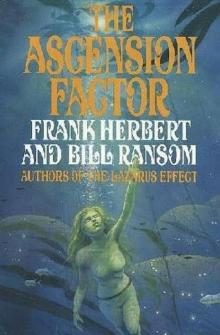 The Ascension Factor
The Ascension Factor The Heaven Makers
The Heaven Makers Children of Dune
Children of Dune Old Rambling House
Old Rambling House Dune
Dune The Worlds of Frank Herbert
The Worlds of Frank Herbert The Jesus Incident
The Jesus Incident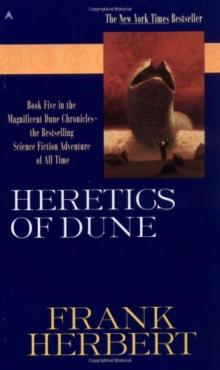 Heretics of Dune
Heretics of Dune Whipping Star
Whipping Star Dune Messiah
Dune Messiah Man of Two Worlds
Man of Two Worlds The Book of Frank Herbert
The Book of Frank Herbert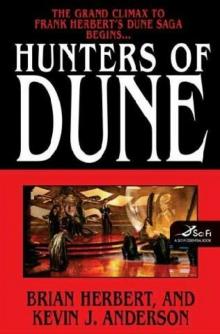 Hunters Of Dune
Hunters Of Dune The Tactful Saboteur
The Tactful Saboteur Soul Catcher
Soul Catcher God Emperor of Dune
God Emperor of Dune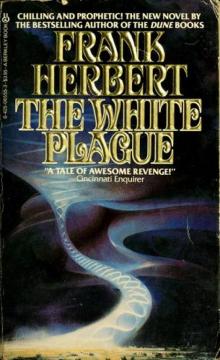 The White Plague
The White Plague The Green Brain
The Green Brain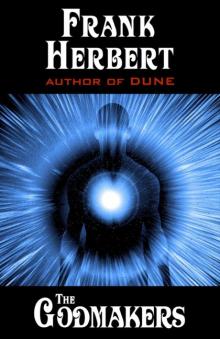 The Godmakers
The Godmakers Sandworms of Dune
Sandworms of Dune Destination Void
Destination Void The Dosadi Experiment
The Dosadi Experiment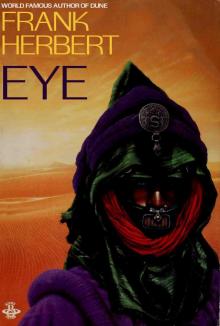 Eye
Eye High-Opp
High-Opp The Eyes of Heisenberg
The Eyes of Heisenberg Missing Link
Missing Link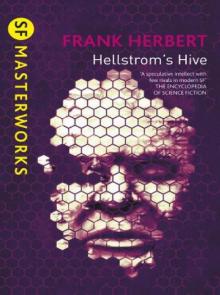 Hellstrom's Hive
Hellstrom's Hive Chapterhouse: Dune
Chapterhouse: Dune The Santaroga Barrier
The Santaroga Barrier The Dragon in the Sea
The Dragon in the Sea Operation Haystack
Operation Haystack A Thorn in the Bush
A Thorn in the Bush Four Unpublished Novels
Four Unpublished Novels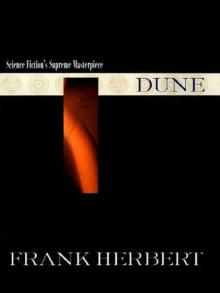 Dune dc-1
Dune dc-1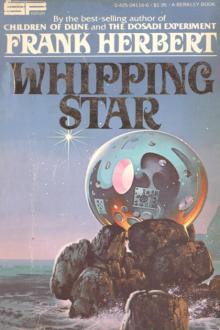 Jorj X. McKie 1 - Whipping Star
Jorj X. McKie 1 - Whipping Star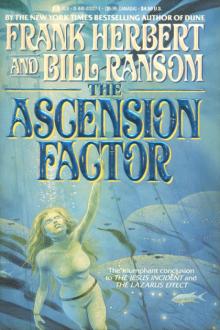 DV 4 - The Ascension Factor
DV 4 - The Ascension Factor Frank Herbert - Dune Book 4 - God Emperor Of Dune
Frank Herbert - Dune Book 4 - God Emperor Of Dune ChapterHouse: Dune dc-6
ChapterHouse: Dune dc-6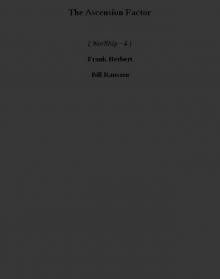 The Ascension Factor w-4
The Ascension Factor w-4 A Game of Authors
A Game of Authors Children of Dune dc-3
Children of Dune dc-3 Destination: Void: Prequel to the Pandora Sequence
Destination: Void: Prequel to the Pandora Sequence The Collected Stories of Frank Herbert
The Collected Stories of Frank Herbert Dune Messiah dc-2
Dune Messiah dc-2 Frank Herbert - Dune Book 5 - Heretics of Dune
Frank Herbert - Dune Book 5 - Heretics of Dune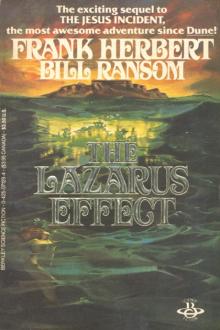 DV 3 - The Lazarus Effect
DV 3 - The Lazarus Effect The Jesus Incident w-2
The Jesus Incident w-2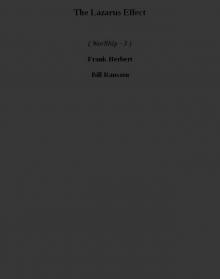 The Lazarus Effect w-3
The Lazarus Effect w-3 Frank Herbert
Frank Herbert The Ascension Factor: Pandora Sequence
The Ascension Factor: Pandora Sequence Dune (40th Anniversary Edition)
Dune (40th Anniversary Edition) The Dosadi Experiment c-2
The Dosadi Experiment c-2 The Lazarus Effect
The Lazarus Effect God Emperor of Dune dc-4
God Emperor of Dune dc-4 The Pandora Sequence: The Jesus Incident, the Lazarus Effect, the Ascension Factor
The Pandora Sequence: The Jesus Incident, the Lazarus Effect, the Ascension Factor The Green Brain (v4.0)
The Green Brain (v4.0) The Heaven Makers (v4.0)
The Heaven Makers (v4.0) Heretics of Dune dc-5
Heretics of Dune dc-5